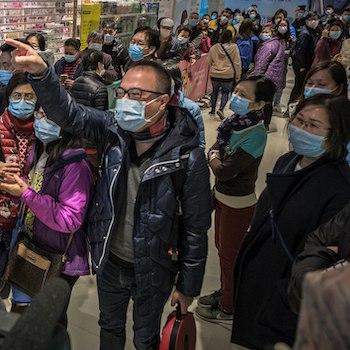By Alex Berezow, PhD; Josh Bloom, PhD; Chuck Dinerstein, MD, MBA; and Thom Golab
The conventional wisdom regarding COVID-19 changes every other week.
Up until this point, the general consensus among the scientific and medical communities was that healthy people should not be wearing face masks unless they are directly caring for an infected person. But now, a growing chorus proclaims that everybody should be wearing masks, just like the citizens of many Asian countries. This confusion can be shown in just two headlines from the past 24 hours:
CNN: WHO stands by recommendation to not wear masks if you are not sick or not caring for someone who is sick
Wired: It's Time to Face Facts, America: Masks Work
So, what's the truth? Unfortunately, there is no clear-cut right or wrong answer, and we are forced to conclude with an indecisive "maybe."**
Before we go further, however, we must first describe what we mean by a "mask." We are talking about surgical masks, those that cover the mouth and nose but are neither tightly fitted nor occlusive, meaning that a person can breathe air through and around the mask. N95 masks are specialized masks, and any diversion of supplies or manufacturing capability to a civilian population who can protect themselves currently by staying at home is unwarranted until those supply chains are secure and adequately stocked.
The pros and cons of the widespread wearing of face masks are described below in a series of points and counterpoints.
Protection
Point: Because the novel coronavirus (called SARS-CoV-2) is a respiratory virus, it almost certainly spreads via respiratory droplets. Masks can help catch the larger droplets as a person exhales. A mask may also prevent indirect transmission, for example by preventing the wearer from touching his face.
Counterpoint: Once the virus is aerosolized, a mask's effectiveness decreases. While a mask may help prevent an infected person from expelling the virus, it may not help a healthy person from inhaling an already aerosolized virus. Also, a mask does not cover a person's eyes.
Psychology
Point: Masks serve as a reminder to engage in proper hygienic behavior and social distancing. Combined, these behaviors can reduce transmission of the coronavirus.
Counterpoint: A mask might give the wearer a false sense of security. A person who wears a mask but fails to wash his hands, for instance, is still putting himself and others at risk.
Professional Opinions
Point: Doctors on the front line are demanding that more people wear masks. We should listen to them.
Counterpoint: The CDC and WHO both recommend against healthy people wearing masks (unless they are caring for someone who is sick). Besides, we do not have an unlimited supply of masks, and it's better for the doctors and nurses on the front line to have them.
C'mon, Masks Clearly Work
Point: Isn't it rather obvious? Some protection is better than no protection.
Counterpoint: Wearing masks in public is very common in many Asian cultures, yet they get seasonal influenza, just like everybody else.
Conclusions
No strong conclusions can be drawn. Maybe face masks would help, but maybe they won't. If there is any benefit, it probably lies in protecting the public from a potentially infected wearer rather than the wearer from a potentially infected public.
**Note: Dr. Chuck Dinerstein has written a follow-up article in which he suggests that the public wear face masks.




